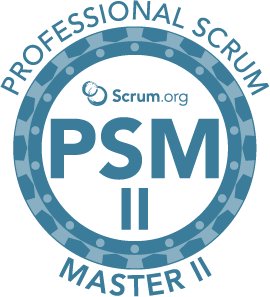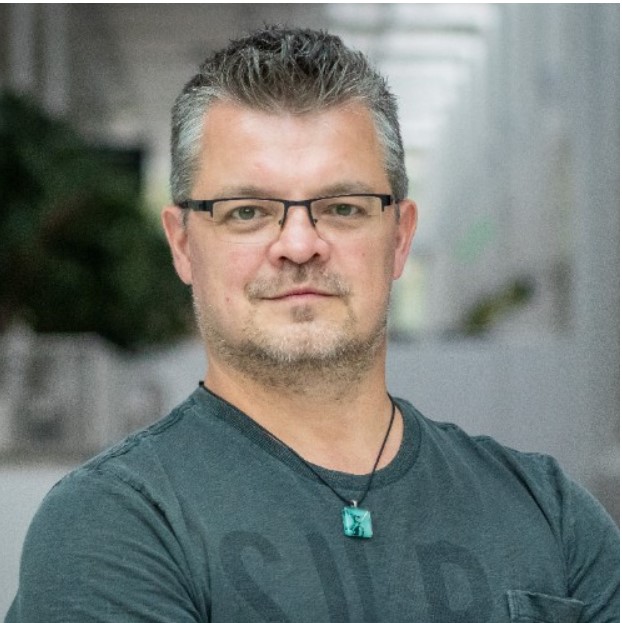Professional Scrum Master™ II (inglise keeles)
Koolituse maht: 16 akadeemilist tundi (2 päeva)
Sihtgrupp: The Professional Scrum Master II course is an advanced course specifically designed for experienced Scrum Masters who have a thorough understanding of the Scrum framework. It is particularly beneficial for those people with at least one year of Scrum Master experience. Scrum Masters, agile coaches, team leaders, team coaches, team leads, technical managers, technical leads.
Koolitusel osalemise eeldused: You should have work experience as a Scrum Master and a strong understanding of the fundamentals of scrum. Having basic level Scrum Master certification (PSM I, CSM) is not mandatory, but it is strongly recommended.
Prior to course attendance, you will get the most out of your training if you:
- Have studied the Scrum Guide (required)
- Have passed the Scrum Open assessment
- Have a solid understanding of Scrum either through working on a Scrum Team
- Have been involved in building or enhancing product (e.g. software application/service) using Scrum
- Have read one of the Scrum books of Ken Schwaber
Koolituse kirjeldus
Professional Scrum Master™ II (PSM II) course is a 2-day advanced Scrum Master class designed to support Scrum Masters in their professional development. The PSM II course is intended for Scrum Masters with at least one year of experience who are looking to grow their knowledge and abilities as a Scrum Master. This course is one step in that journey. The course also includes a free attempt at the globally recognized Professional Scrum Master II (PSM II) certification exam.
Unlike the Professional Scrum Master (PSM) course which focuses on how to use Scrum, the Scrum framework and the role of the Scrum Master, PSM II is an advanced course helping students to understand the stances that characterize an effective Scrum Master and servant-leader while diving deep into how they serve the Development Team, Product Owner and organization. The course then teaches students about related practices and skills to enable them to have the right types of conversations and how to apply them to become better Scrum Masters.
Over the 2 days, students will learn about areas critical to growing as a successful Scrum Master such as how the principles and values of Scrum help guide Scrum Masters in the decisions they make and how the Scrum Master can help change the environment of Scrum Teams, creating an environment for agility to thrive. The Scrum Master role is complex and often, a Scrum Master must be able to apply different stances in order to be effective, such as:
- The Scrum Master as a Teacher
- The Scrum Master as a Coach & Mentor
- The Scrum Master as a Change Agent
- The Scrum Master as a Facilitator
As a Scrum Master, being able to identify, and effectively apply, which stance would benefit your team the most depending on the situation or circumstance could prove to be the key to the success of your team.
As a Scrum Master, part of your role is to help management and other stakeholders across your organization understand the benefits of Scrum and Agile. Therefore, it is imperative that you have the information and background that is needed to gain credibility in order to be an effective change agent.
Certification
The course prepares for Professional Scrum Master II (PSM II) assessment by Scrum.org. The assessment is included in the course price. Those willing to take the assessment can do it on their own computers after the course. Instructions how to order and take the assessment will be provided during the course.
Teemad:
1. Towards Mastery
- ShuHaRi
2. Lean, Agile, & Scrum
Agile and Lean Values, Principles, and Worldview
- Agile Manifesto and Scrum
- Historical outline of Scrum and Agile
- Other Lean/Agile development frameworks
- ScrumMaster rectifying violation of Agile principles
- Personality traits of an excellent ScrumMaster
Empirical Process Control
- Inspect-and-adapt process in Scrum events
- When does transparency, inspection, and adaption not work effectively?
3. Scrum Master Core Competencies
Facilitation
- Facilitative listening techniques
- Multiple frames of reference
- Divergent thinking and convergent thinking
- Contents and agenda
- Recused Scrum Master
- Obstacles to clear communication
- Working agreement
Coaching
- Coaching Stance
- Coaching Techniques
- Coaching Let’s do it
Training
- Explain Scrum to a Business Stakeholder
4. Service to the Development Team
Definition of Done
- Definition of Done for a non-software product
- Improving “Done.”
- Creating Definition of Done
Self-Organization
- Coaching to foster greater self-organization
- Self-organizing team and challenges during a retrospective
- Countermeasures to challenges
Team Dynamics
- A working group vs. a team
- Team formation and development
- Attributes of effective teams
- Improving team performance
Value of Development Practices
5. Services to the Product Owner
Coaching the Product Owner
- From Product Vision to Product Backlog
- Facilitating the creation of the Product Vision
- Creating Product Backlog items
- Facilitating a Product Backlog refinement session
- Product Owner in the retrospective
6. Service to the Organization
Resolving Impediments
- Addressing typical impediments for a Scrum Team
- Impediment evaluation in depth
- Identify a root cause(s) of an impediment
Scaling Scrum
- Why scaling might not be such a great idea
- Techniques for handling dependencies
- Scaling frameworks
Organizational Change
- Change in an organization
7. Scrum Mastery
Personal Development
- Personal fulfillment of the five Scrum Values
- Your driving factors
- Destructive conflict
- Responding to a conflict
Servant Leadership
-
- Goals and attributes of a servant leader
- Resolving an organizational impediment
Koolituse õpiväljundid
After completing this course, students will know:
- What practices, tools, skills and stances make an effective Scrum Master
- How the Scrum principles and values help guide Scrum Masters in the decisions they make
- How the Scrum Master acts as a servant-leader and improve their ability in this role
- What the Scrum Master can do to support Development Teams and Product Owners to become more effective
- Ways that the Scrum Master can help to change the environment making it more conducive for Scrum Teams to be successful with greater agility
- Provide tips and techniques for the Scrum Master to work with the rest of the organization in support of their Scrum Teams.
Eksam:
You can take the test from your own computer at a time of your choice.
Professional Scrum Master II (PSM II) test:
- Passing score: 85%
- Time limit: 90 minutes
- Number of Questions: 30 (partial credit provided on some questions
After passing the exam, you are listed as Professional Scrum Master II (PSM II) in the web-page of Scrum.org™. Free Credly digital credential included. Lifetime certification – no annual renewal fee required
Koolitushind sisaldab:
- õppematerjale;
- eksamivautšerit;
- tunnistust.
Täienduskoolituse õppekavarühm: juhtimine ja haldus
Koolitaja
-
 Anssi Rusanen
Anssi RusanenAnssi is experienced ICT professional, coach and trainer.
Certificates:
SAFe (4.6) Program Consultant (SPC) (2019)
Certified Scrum Master (2007)
Certified Scrum Professional (2009, expired)
Professional Scrum Master I (2010)
Professional Scrum Developer (.Net) (2010)
Professional Scrum Developer Trainer (.Net) (2010)
TOGAF 9 Foundation (2011)
ISEB ISTQB Foundation (2013)Presentation skills: Over 15 years of experience of giving presentations and training sessions for ex-pert audience in both English and Finnish languages. Teacher’s degree.
Team Leadership: Resourcing, understanding and resolving team related issues (competences, peo-ple, collaboration etc), personal coaching and growth facilitating, competence strategy building and implementing.
Enterprise, information and application architectures: Designing, resolving and consulting architectures on application, information sys-tems and enterprise level (TOGAF 9 foundation certified)
Project work: Working inside and leading a software project, coaching and mentoring. Improv-ing corporate processes. Tools and methods within a software development (Ag-ile, SAFe, Lean, Scrum, “traditional” methods).
Software implementation: C#, Java, Node.js, SpringBoot, HTML(5), CSS(3), Python, C++, C, SQL, XML
Tools: Android Studio, MS Visual Studio, Team Foundation Server, Eclipse, Jira, Git, Ra-tional Software Modeler, MOSS, MS CRM, MS Office






